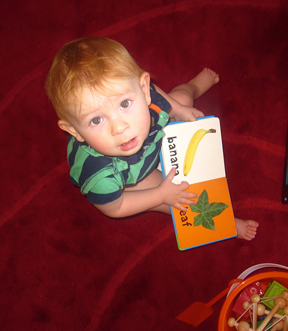 We live in a culture deeply devoted to getting its citizens to read at the earliest possible ages. Whether it’s flashcards, alphabet-focused toys, or “teachable moments about letters” sprinkled throughout daily life with toddlers and preschoolers, we seem hellbent on early reading.
We live in a culture deeply devoted to getting its citizens to read at the earliest possible ages. Whether it’s flashcards, alphabet-focused toys, or “teachable moments about letters” sprinkled throughout daily life with toddlers and preschoolers, we seem hellbent on early reading.
And parents feel little choice in the matter: sadly, a 5- or 6-year-old kindergarden student in public or conventional private school who isn’t quite fluent with letters is already behind the 8-ball.
Child psychologist David Elkind has devoted his professional life at Tufts University to studying the costs of “hurrying” children. He points out that true reading readiness only emerges once a child has attained the neuro-cognitive milestone of syllogistic reasoning (“All men are mortal; Socrates is a man; thus Socrates is mortal”), which dawns during the concrete operational stage of cognitive development.
This “con-op leap” happens around age seven, and is a biologically based milestone, just like the shedding of baby teeth or the onset of puberty. How many parents fret if their son hasn’t managed to lose his first tooth as soon as his friend did… or if their daughter at thirteen “still just has not been able to get her period”? {Read more at mothering.com}
Image by tornatore through a Creative Commons license
Tags: learning disabilities, learning disorders, reading readiness, sensory integration, sensory processing disorder



Hi Marcy. I enjoyed your article. I have 4 children, all who show having neuro issues. Much of what you wrote about I have also learned through the Brain Highways program. It has changed my families present and future. Through this program, we have been creeping and crawling on the floor since August and have seen tremendous and exciting changes in our family. You talk about trying to create peaceful children, I have learned that by creeping on the floor and developing the pons center of the brain, this effect happens naturally. Unfortunately, due to the SIDS scare, our babies are not spending enough time on their bellies anymore. You really ought to look into their methods as I think it would only enhance what you already know. Thanks for writing your article. Our society needs to know that basic movements can really change/wire the brain, and that drugs are not the only answer.
Thank you, Megan, for bringing up this resource. Indeed, creeping & crawling are so key to fully vibrant, integrated neurodevelopment.